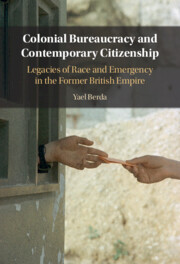Book contents
- Colonial Bureaucracy and Contemporary Citizenship
- Colonial Bureaucracy and Contemporary Citizenship
- Copyright page
- Contents
- Figures
- Preface
- Acknowledgments
- Archive Abbreviations
- Introduction: The Spectacle of Independence and the Specter of Bureaucracy
- Part I Hybrid Bureaucracy: How Race and Emergency Shaped the Organization of Colonial Rule
- Part II The Axis of Suspicion: Classifications of Identity and Mobility in Crises
- Part III Administrative Memory and the Legacies of Emergency
- Conclusion: The File and the Checkpoint – Colonial Bureaucracy and the Making of Contemporary Citizenship
- Notes
- Bibliography
- Index
Introduction: The Spectacle of Independence and the Specter of Bureaucracy
Published online by Cambridge University Press: 10 November 2022
- Colonial Bureaucracy and Contemporary Citizenship
- Colonial Bureaucracy and Contemporary Citizenship
- Copyright page
- Contents
- Figures
- Preface
- Acknowledgments
- Archive Abbreviations
- Introduction: The Spectacle of Independence and the Specter of Bureaucracy
- Part I Hybrid Bureaucracy: How Race and Emergency Shaped the Organization of Colonial Rule
- Part II The Axis of Suspicion: Classifications of Identity and Mobility in Crises
- Part III Administrative Memory and the Legacies of Emergency
- Conclusion: The File and the Checkpoint – Colonial Bureaucracy and the Making of Contemporary Citizenship
- Notes
- Bibliography
- Index
Summary
On the eve of India’s independence late on August 14, 1947, India’s first prime minister, Jawaharlal Nehru, narrated the moment of transition from colonial rule to national sovereignty in front of the Constituent Assembly. It was a moment of great promise as India embarked on the most significant experiment with democracy in human history, the largest universal franchise in elections, and the formation of the longest-standing constitution in postcolonial history to date.2 It was also the night before India’s formal partition into the dominions of India and Pakistan, the night before waves of genocidal violence and forced migration shaped the new nations within the newly delineated territories.3
In national narratives, one rarely thinks of such a historic moment of independence and decolonization as also a moment of the transmission to the new states of colonial bureaucratic practices and routines and the politics embedded within them. The spectacle of independence, when subjects of the empire were to become future citizens of their own newly partitioned states, tends to eclipse the dimmer side of that which resists change in political life.
- Type
- Chapter
- Information
- Colonial Bureaucracy and Contemporary Citizenship , pp. 1 - 28Publisher: Cambridge University PressPrint publication year: 2022



